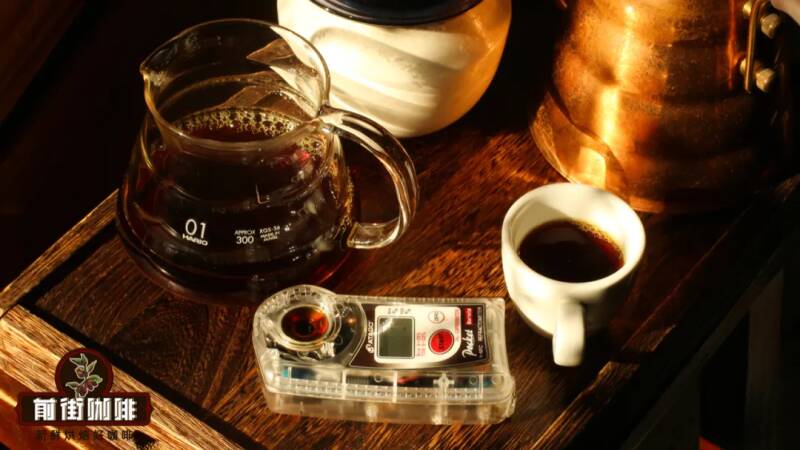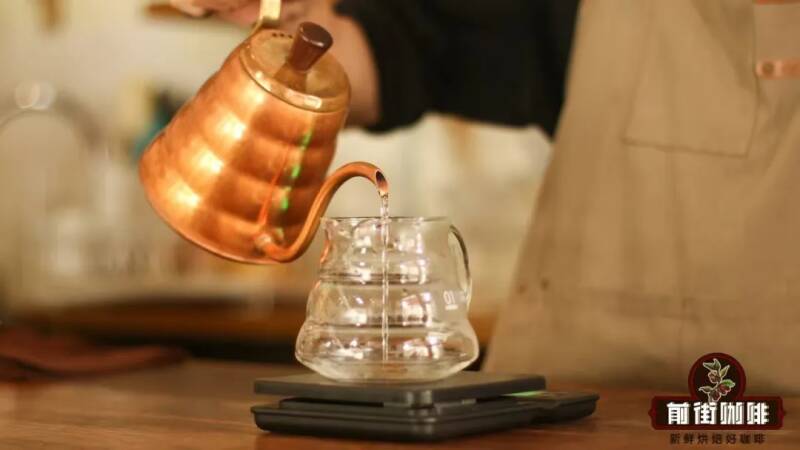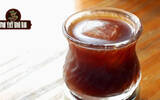What is the reason why I can't drink the flavor of coffee? The operation process of making coffee by hand! How to create the flavor of coffee? What is the best proportion of powder and water in hand-brewed coffee? Do I need to raise single coffee beans?
When we are beginning to make coffee by hand, we always encounter many difficult problems. For example, the common conditions that Qianjie often share are the coffee brewed with obvious bitter and mixed taste, sharp sour taste, or a strong water feeling and thin taste. So what Qianjie wants to share today is still a problem that you often encounter when you start, but compared to the above-mentioned miscellaneous diseases, the characteristics will not be so obvious. It said: "The brewed coffee is not difficult to drink, but its flavor is very vague and difficult to distinguish. "
Many friends often blame this situation on "beans themselves behave like this" and then fail to correct the problem. But in fact, the vague flavor is also caused by many reasons other than beans. So today, Qianjie came to share how to improve this situation and make the flavor of the coffee washed out more obvious.
1. The coffee concentration is too high. First of all, a common reason is that the coffee concentration is too high! When Qianjie shares tweets related to concentration, he always mentions that when the concentration of coffee is too high, it will be difficult for us to distinguish the detailed flavor from the coffee.

Just like it is difficult for us to quickly identify specific faces when there is a dense crowd, when the concentration of coffee is too high, the flavor substances of coffee will be very concentrated, and taste buds and sense of smell cannot quickly process the too large and concentrated information in a short period of time. So we simply package all the flavors into a fuzzy whole and deliver them to the brain. A situation like this is easy to solve. We only need to add more water during the brewing process, or add a little bypass water to the coffee after the brewing process, so that the concentration of the coffee can be diluted and the flavor can be displayed.
But what we need to know is that in many cases, the high concentration is not because we changed the ratio of powder and water during brewing, but because we did not change the ratio of powder and water. What does it mean? That is, the same set of extraction parameters does not apply to all coffee beans. For example: Some coffee beans have lower density and are easier to extract, so the same extraction parameters may extract more substances when used on them. So even if it is brewed, like other coffee beans, using a ratio of powder to water of 1:15, its concentration will be higher than other coffees, resulting in a less clear flavor.
Therefore, if the flavor characteristics of the coffee you drink are not obvious enough, and then there is no sharp sour taste with insufficient extraction, or over-extracted bitter and mixed taste, and the taste is relatively strong, then it is likely that the concentration is too high. We only need to add more water (10 - 20ml) when brewing, or dilute the concentration by pass (10 - 20ml) after brewing, which should improve this situation and make the flavor more obvious and easy to distinguish.
2. Excessive extraction The second common reason is excessive extraction! When we dissolve too much bitterness and impurities in coffee, the flavor of coffee will not be so obvious. Because we are sensitive to these flavors, when these substances account for a little more in coffee, they will mask a certain flavor.
I believe there is no need to introduce the reasons for excessive extraction, because everyone is already familiar with it, such as too fine grinding, too high water temperature, too long time, or too strong stirring, etc., all cause the extraction efficiency to overflow and make the coffee over-extracted. The main factor. But as long as the over-extraction is not too outrageous, we only need to select one of them to improve, such as making the grinding thicker, lowering the water temperature a little, shortening the time, or reducing the degree of stirring ~ If the over-extraction is exaggerated and the bitterness is very obvious, then it is necessary to re-examine the degree of compatibility of the extraction parameters with the coffee beans, and then re-formulate it.
3. The coffee beans are too fresh. If we brew coffee beans that have just been roasted for a while, it is also easy to make a cup of coffee with a vague flavor. The reason is that the beans are so fresh!
The carbon dioxide content of coffee beans is at its peak not long after they are roasted. The presence of carbon dioxide will hinder hot water extraction and reduce the extraction rate. If we directly put beans in this state into brewing without adjusting the brewing parameters, it will be easy to have insufficient extraction due to the high carbon dioxide content. At the same time, freshly roasted coffee beans will also have a dryness residue from roasting over a period of time, which will also affect the flavor of the coffee. Coupled with the lack of extraction, the flavor of the brewed coffee will not be so easy to capture.
There are two solutions to this situation. The more traditional solution is to put the beans for a period of time and cultivate them. After almost all the carbon dioxide and dryness in the beans have been emitted, we will start making coffee. Shallow baked beans generally take 3 to 5 days to raise them, while deep-baked beans can be raised slightly longer. Another method is to affect the extraction efficiency of coffee by adjusting the parameters of the coffee, such as pre-grinding, grinding and fine, raising the water temperature, extending the steaming time, increasing the number/intensity of agitation, etc. Qianjie has shared it before, so I won't repeat it here.
4. Making coffee with excellent water quality. Although one thing may seem ordinary, it can directly affect the taste and taste of coffee. That's right! It is-water.
For coffee making, the choice of water source is very important. For example, for American coffee, the choice of water will directly affect the taste of the coffee; or for hand-brewed coffee, the choice of water will affect the flavor of the brewed coffee. Although water looks colorless and odorless, most of them actually contain minerals, and it is the presence of these minerals that affects the taste and taste of coffee. The more mineral content in the water, the harder the water will be, and vice versa, the softer it will be. Water that is too hard and too soft is not suitable for brewing coffee because they cannot fully dissolve the flavor substances in coffee. In addition to hardness and softness, it is also affected by pH, but because it is too complicated to talk about, I won't mention it too much here. Interested friends can move to the front street to learn about it in previous articles.
In the "Drinking Water Quality Guidelines" issued by the WHO, water with a hardness of less than 200ppm is called soft water, and water above is called hard water. As for the recommendation of water for brewing coffee, SCA recommends that the hardness range of water be controlled to 75 - 250ppm, with the ideal value being 150ppm. However, it is generally easier to make coffee out of the delicious range of water used below 100ppm. Therefore, we can also improve the flavor of coffee by changing the water source. It is worth mentioning that try not to use unfiltered tap water for boiling. Although tap water in many cities meets soft water standards, the taste that comes out is not pleasant because there are no minerals in the water that are beneficial for extraction. At the same time, the kettle will easily become dirty after using it for a long time, which will add many cleaning problems. But just filter it ~

So the above are four directions that can improve the flavor ambiguity. You can compare them and see if adjustments need to be made ~
- END -
Important Notice :
前街咖啡 FrontStreet Coffee has moved to new addredd:
FrontStreet Coffee Address: 315,Donghua East Road,GuangZhou
Tel:020 38364473
- Prev

How to use the filter of the cold extract coffee maker? How to filter the coffee grounds clean?
Experienced friends know that there are many factors that affect the taste of cold extracted coffee. Among them, the most influential ones are the choice of coffee beans, grinding degree, ratio of powder and water, and soaking time. Secondly, there are some small production skills, such as full stirring, ensuring that containers are clean, water quality, etc., which will more or less change coffee.
- Next

Are deep-roasted coffee beans suitable for hand-flushing? What is the water temperature for deep-roasted hand-brewed coffee? What is the reason why the brewed coffee is bitter? How to make deep coffee? What is the difference between deep and light coffee?
According to today's Meteorological Bureau, the high temperatures in Guangdong will continue until around November. And this means that in the next two months, we will still be inseparable from the cool-relieving artifact-iced coffee! Then some friends are like Qianjie. After drinking too much sweet and sour lightly roasted iced coffee, they sometimes want to replace it with one.
Related
- What grade does Jamaica Blue Mountain No. 1 coffee belong to and how to drink it better? What is the highest grade of Blue Mountain coffee for coffee aristocrats?
- What are the flavor characteristics of the world-famous coffee Blue Mountain No. 1 Golden Mantelin? What are the characteristics of deep-roasted bitter coffee?
- Can I make coffee a second time in an Italian hand-brewed mocha pot? Why can't coffee be brewed several times like tea leaves?
- Hand-brewed coffee flows with a knife and a tornado. How to brew it? What is the proportion of grinding water and water temperature divided into?
- What is the difference between Indonesian Sumatra Mantinin coffee and gold Mantinin? How to distinguish between real and fake golden Mantelin coffee?
- What does bypass mean in coffee? Why can hand-brewed coffee and water make it better?
- Unexpected! Ruixing Telunsu lattes use a smoothie machine to foam milk?!
- % Arabia's first store in Henan opens into the village?! Netizen: Thought it was P's
- Does an authentic standard mocha coffee recipe use chocolate sauce or powder? Mocha Latte/Dirty Coffee/Salty Mocha Coffee Recipe Share!
- What is the difference between Vietnam egg coffee and Norway egg coffee? Hand-brewed single product coffee filter paper filter cloth filter flat solution!

